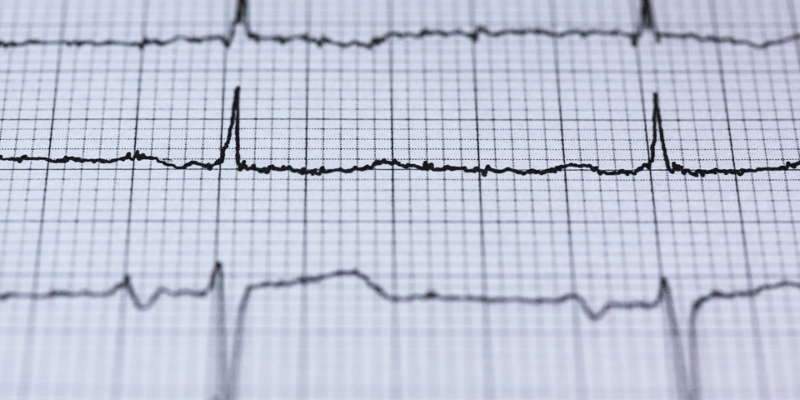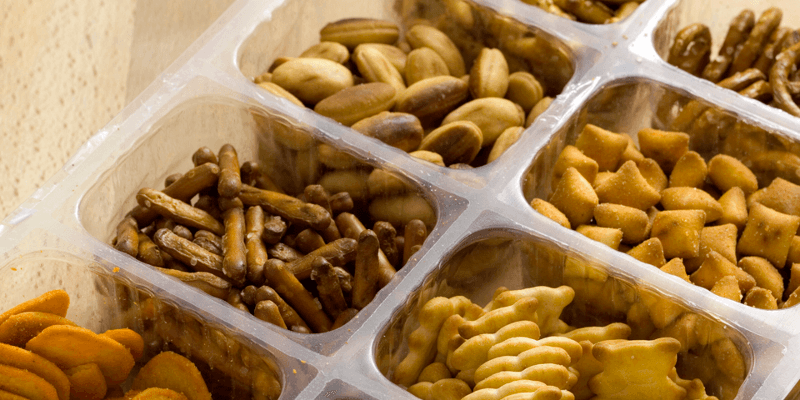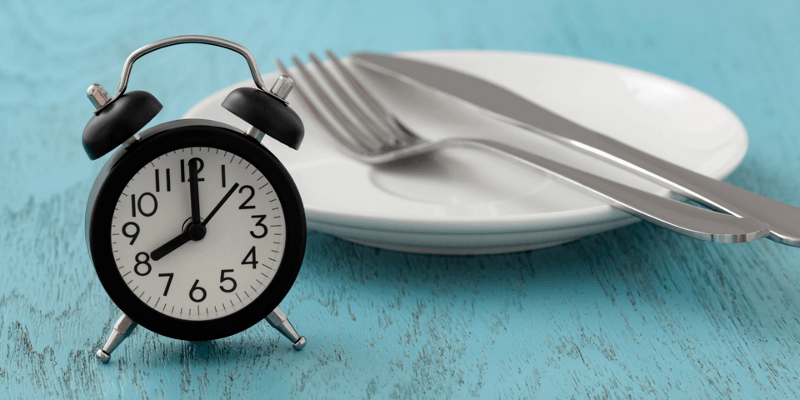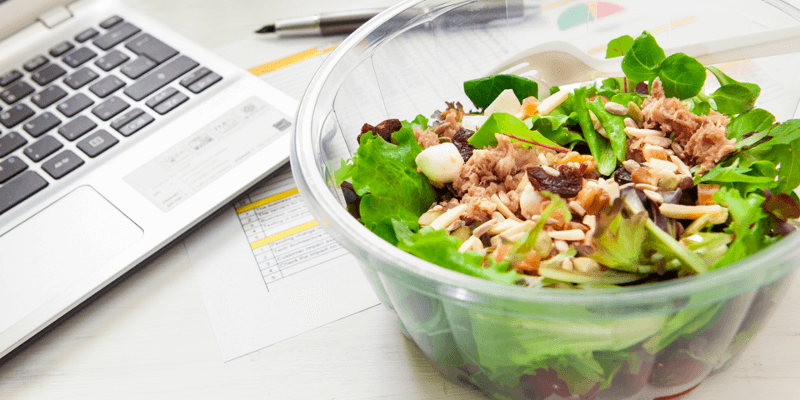It's a bit of a cliché, but there's a lot of truth in the phrase 'you are what you eat'. However, for some people and their training demands, it's not just what you eat, but when you eat that counts. Meal timing can become an important factor in getting the results you're working hard towards.
For most people, meal timing isn't a top priority - there are other things they should focus on that will deliver bigger results. However, for some who already have a good structure in place with their training diet, meal timing can bring an added boost.
More...
Humans have evolved in an environment of natural rhythms and constant change. Its no surprise, therefore, to find that we respond to the rhythms around us. Furthermore, we're also 'programmed' with several rhythms of our own. Of these, the circadian rhythm is undoubtedly the most important and powerful. It governs our waking and sleeping patterns, daily fluctuations in body temperature, and mental and physical performance.

These natural rhythms and fluctuations are deeply imprinted in our basic physiology. It makes sense that the timing of our meals is important for our physical and mental performance.
Basics of meal timing
As we'll see shortly, your natural rhythms do indeed impact on optimum meal timing. But if you're not a couch potato, there's more to it than that. When, how hard, how long and how often you train become really important factors in planning when to eat. This is particularly true when you're trying to ensure optimum recovery and training response. For this post; we'll begin by looking at the basic requirements of meal timing. We'll then consider the impact of training on these requirements.
If you could sum up optimum meal timing to match your body's natural rhythms up in a sentence, it would be: 'eat early, eat often, eat sparingly.' There aren't many truly golden rules in nutrition. Breakfasting like a king is probably one of them. That's because a decent breakfast supports the natural circadian rhythm in the body. It's gearing up for activity and energy production after nighttime rest.
Eat early

Eating a decent breakfast is not just about having more energy to see you through the morning. Study after study has shown that a good breakfast improves your mental acuity and powers of concentration. Not only that, but it also boosts your metabolic rate and helps replenish your muscles for physical activity later in the day. And if you're one of those battling the bulge, think about the following before you fall into the "I'll starve myself all day so I can eat a decent meal in the evening" syndrome:
Eating breakfast actually helps to regulate your appetite later in the day. Those who eat breakfast not only suffer far fewer energy swings and cravings but also tend to automatically make better food choices in the evening.

Ultimately, eating little all day followed by a large evening meal works directly against your body's natural rhythms; you're piling in calories just at the time your activity level is about to fall to its lowest level. That's when your body is least able to utilise them. The bottom line is that any excess evening calories are much more likely to end up deposited as fat around your midriff compared to calories consumed early in the day. In fact, one study showed that when subjects consumed only a single 2000kcal meal (large!) eaten first thing in the morning, they lost weight. However, the same single meal eaten late in the evening produced weight gain.
Eat often (and more sparingly)

Fuelling the human body is not like filling your vehicle's petrol tank at a petrol station. That's because your tummy is not like a holding tank. It's simply the first stage of digestion and subsequent energy release. If you eat a big meal, a large number of calories flood into the body. You'll get rapid rises in blood sugar regardless of whether those calories are needed.
The good news is that your body has mechanisms for dealing with large inputs of energy. It wants to smooth out unwanted blood sugar swings.
The bad news is that it comes at a cost; excess blood sugar is converted to body fat. Body fat is not the ideal fuel for high-intensity exercise performed at a later date.
Large calorie excesses can also cause a rise in blood fats - not good for heart health. They can make you feel tired and sluggish generally since your body becomes preoccupied with digestion. A much better option is to eat much smaller, more frequent meals (four or five a day). The same number of calories consumed this way will supply the body with a more gentle and manageable source of fuel compared to one or two large meals.
Timing your meals and training

Timing your meals to match your natural rhythm is all well and good, but when you start training, a new set of timing demands are in place; as well as ensuring you're optimally fuelled before training, meal timing becomes especially important after training to promote recovery.
Recovery nutrition
Studies have shown that muscles are best able to rapidly absorb carbohydrate for the re-synthesis of muscle glycogen (your body's premium-grade fuel for exercise), and amino acids (from protein) to replace and rebuild muscle fibres, in the period immediately following training and for up to about 90-120 minutes afterwards.

This time frame is like a 'window of opportunity'. During this window, your muscles take in what they need to recover and power you through your next workout. Miss this window, and you won't recover efficiently. Even if you do end up eating exactly the right type and quantity of nutrients later on in the day.
If you only train once a week, this isn't a problem. But for those who train 3 times a week or more, poor recovery nutrition will leave you feeling tired and sluggish for subsequent workouts. It will also diminish your body's capacity to adapt to training, eg poorer muscle growth.
Moreover, research shows that the post-exercise dip in immunity that often occurs after hard training sessions is prolonged by poor recovery nutrition.
It's critical therefore that you try and plan your meal timing. Aim to consume a blend of carbohydrates and proteins (in the ratio of around 2 parts carbohydrate to 1 part protein) as soon as possible after training.
The two easiest ways of achieving this are either to shift your next meal forward so that it falls within the 'window of opportunity', or to plug the gap with a recovery drink that provides an easily assimilated blend of carbohydrate and protein in a ready to drink form. And even if you train very late in the evening, and expect to be retiring soon after, a recovery drink/snack is still essential, as your muscles will be crying out for refuelling.
Pre-exercise nutrition - the main priority with meal timing
Timing your meals for optimum recovery is extremely important for regular trainers. But how should you plan to eat before a workout? Obviously, that will depend to some extent on when you train. But let's assume you're training at lunchtime or in the evening (the most common times to train).
Early in the day

The first and most important rule is to ensure that you've eaten a decent breakfast. A meal containing plenty of high-quality unrefined complex carbohydrate (whole grain cereals, wholemeal bread/toast, fruits, etc.). This will help to ensure your blood sugar levels are high enough to train properly. Even if you've eaten plenty of carbohydrates over the previous few days and your muscles are fully topped up with glycogen. You still need to consume enough carbohydrates during the day to ensure adequate blood sugar levels. That's because low blood sugar levels can reduce the efficiency of the central nervous system. This makes it harder to fully activate the motor neurons needed to fire those muscle fibres. This effect can become quite noticeable if you're trying to perform a hard training session. When training hard, efficient muscle recruitment is essential.
Two to three hours before training
This is the ideal time to have a small, light meal or snack. Especially if you know that you're otherwise going to be hungry by the time you train. However, you need to ensure that whatever you eat is low in fat. This helps it empty from the stomach rapidly.

The carbohydrate it contains should be of the slower-releasing type. Think low GI - eg oats, beans, some starchy fruits like apples and pears, etc.
There are two reasons for this; firstly, a quick releasing sugary snack will give you a temporary blood sugar lift. But it may well produce a dip an hour or two later - exactly what you don't want. Secondly, studies have shown that consuming low GI carbohydrate snacks 2-3 hours before training increases subsequent endurance and the proportion of the energy derived from fat.
Less than thirty minutes before training
Provided you're well fuelled as above and your workout is less than 90 minutes or so, there's no real need to consume anything just before a workout even if you feel a bit peckish. However, if your workout is going to be long and arduous, this is a good time to start fuelling up.
Obviously, anything you consume now has to leave the tummy extremely rapidly. This limits your choice to carbohydrate or carbohydrate/protein drinks. And providing you start training soon after consuming these kinds of drinks, you shouldn't need to worry about blood sugar dips. Drinks taken during exercise (when there's a demand by the muscles for glucose) are far less likely to cause problems.
During training

Is there any need to consume carbohydrate and protein during exercise? This depends on what you define as 'need'. Provided your workout is less than 90 minutes duration, it's unlikely that you'll derive any real performance benefit at that time. However, numerous studies have shown that carbohydrate drinks consumed during training can reduce the amount of glycogen depletion that takes place. This, in turn, means less physiological stress for the body and easier subsequent recovery. In practice, this results in lower levels of stress hormones (eg cortisol) secreted during exercise. This translates into less muscle breakdown during exercise and less post-exercise immune suppression.
There's also evidence that consuming very rapidly digesting protein during training, such as free-form amino acids, or peptides of whey protein, increases the uptake of amino acids into hard-working muscles. This appears to result in bigger strength gains than consuming a post-exercise recovery drink alone.
So there you have it. Next time you're planning your food intake for the week ahead, remember; it might not be just what you eat, but when you eat it that counts.

I landed up on your blog from Google. Thanks for sharing this article. Looking forward to reading more from you.
You're welcome Soumya, glad you found it useful. Let me know if there are any particular topics you are interested in.